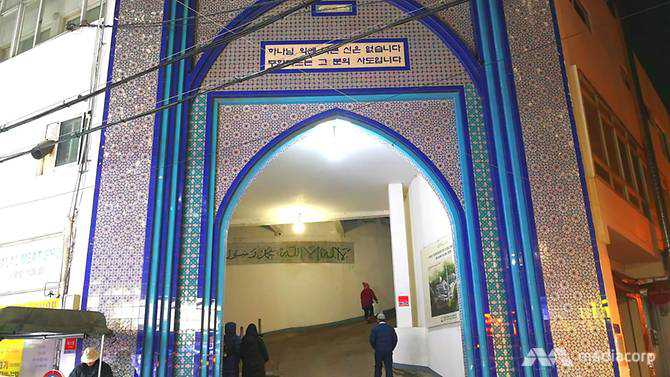Muslim tourists face challenges in South Korea even as country focuses efforts on attracting them
15 December, 2019

South Korea is regarded as a food haven by many, but Indonesian tourist Rati was starving past lunch time as she walked around a park in the country’s second-largest city Busan.
Ms Rati and two of her fellow Muslim travel buddies had had trouble finding Halal-certified food earlier in the day.
While there was halal-certified food near Yongdusan Park in the Nampodong area which they were visiting, it was not food she and her friends were interested in.
“There is halal food that’s Indian, but we want to have halal Korean food,” lamented her friend Meri, 30.
They had a solution though - eating the seafood the port city is famed for, which they said is considered “safe to eat”.
According to the Islamic Religious Council in Singapore, animals which live in water and cannot survive outside it, such as fish, except those that are poisonous, intoxicating or hazardous to health are “halal”.
Finding a space to pray however, proved more difficult for the travelers. They wanted to go to the only mosque in Busan, but found that it was inconveniently located, about an hour away from the tourist spots they were visiting.
Having also visited the country’s capital Seoul, they said that they found it more difficult to travel in Busan, compared to in Seoul.
Some businesses use informal labels to indicate Muslim-friendly snacks. (Photo: Jalelah Abu Baker)
“In Seoul, all the halal food is in the same area in Itaewon so we can go there,” Ms Meri said.
Despite the relative ease in Seoul, Ms Wan Rusnee Wangsoh faced difficulties, as she could not find Muslim-friendly food in tourist areas like Hongdae.
Visiting the South Korean capital for the second time in two years, the 20-year-old Thai made sure to book an apartment that came with a kitchen so she and her younger sister could cook simple meals to bring along with them.
SOUTH KOREA TRIES TO ATTRACT MUSLIM TOURISTS
Such challenges faced by Muslim tourists come despite South Korea’s push to attract them.
According to the Korean Tourism Organisation (KTO) website, Muslim tourists from Asia and Oceania are a “focus area”. The website also has a page dedicated to information for Muslims, which lists Muslim-friendly restaurants and prayer rooms, acknowledging that “it is not easy for Muslim travelers to find appropriate food or prayer rooms in a non-Islamic country”.
The KTO also said it is doing its best to make the country a Muslim-friendly destination.
South Korea’s designated representative media Yonhap News Agency reported in September this year that the number of Muslim tourists to the country is set to top 1 million if travel trends continue.
Yonhap quoted the KTO in reporting that more than 500,000 Muslim tourists visited the nation in the first half of this year, a 9.8 per cent increase compared to the same period last year.
BECOMING MORE MUSLIM-FRIENDLY
Imam at Seoul’s Korea Muslim Federation Abdul Rahman Lee told CNA that although it is still a challenge for Muslim tourists to get halal food, many changes have taken place in the last four to years to make Seoul more Muslim-friendly.
Prayer rooms are available at shopping malls like Lotte Department Store, Everland, a theme park and popular tourist destination Nami Island.
Airports also have prayer rooms, with the latest in Jeju which opened last year, Mr Lee said. Fueling the demand are also direct flights from Islamic countries, he said.
He acknowledged that halal Korean food is “very limited”- fewer than 10- compared to halal food that is Indian or Malay.
However, he said that tourists are increasingly learning about the ingredients in them, so they know whether they in fact only contain seafood and vegetables.
The federation also started holding seminars on how to be Muslim-friendly every two months about five years ago, he said.
“We started the classes because we found out that companies are producing halal food, halal materials, halal items but they don’t understand what is halal,” he said.
The room where the classes are held can accommodate a maximum of 60 people, and they have seen full attendance from the start, he said.
“The demand is increasing, but when the class is full, we ask them to sign up for the next class,” he said.
DIFFICULTIES WORTH IT FOR SOME
While it is not easy keeping to the requirements of her faith in South Korea, Ms Rusnee said she enjoys traveling there, especially to buy merchandise from her favourite K-Pop band NCT.
It is the band which inspired her to make the trip. Like Rusnee, Meri and Rati travelled to the country, attracted by its television dramas and music.
Ms Lailatul Husna, a Malaysian studying in Korea said that restaurants in Seoul are becoming more aware of Muslims.
“Some restaurants serve halal meat even though they are not halal-certified,” she said.
Ms Husna earned a scholarship to read chemical engineering in the Korean language at Dongyang Mirae University, and learnt Korean in her home country for a year before embarking on her degree. She has been studying there for two years.
Ms Meri holds hope that the country will become more Muslim-friendly.
“I’d like to see more restaurants getting Halal-certified, and labels to show which snacks we can have,” she said.
Source:
TAG(s):
